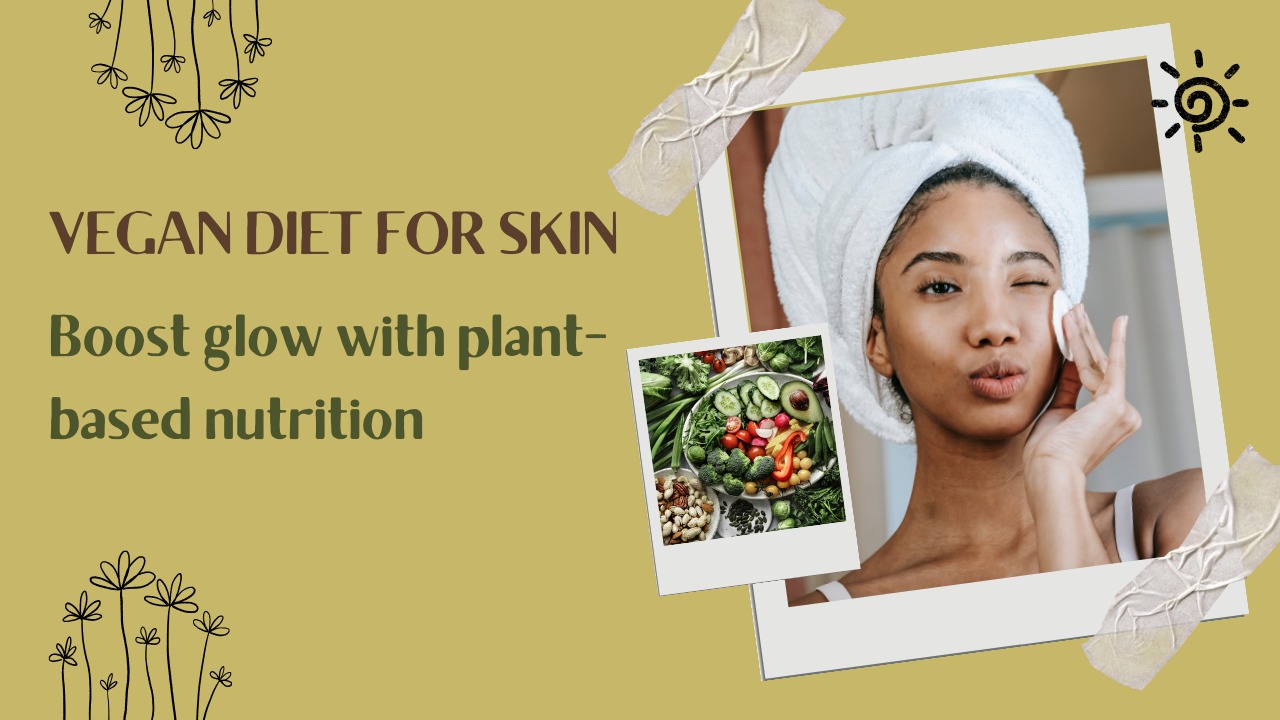Vegan diet for skin offers a natural path to glowing, youthful skin by focusing on plant-based, nutrient-rich foods. Packed with antioxidants, vitamins, and healthy fats, this diet helps fight inflammation, reduce breakouts, and boost collagen production. It’s not just about cutting out animal products—it’s about fueling your skin with what it truly needs to thrive.
Vegan diet for skin emphasizes whole foods like leafy greens, berries, nuts, seeds, and legumes. These are loaded with vitamins A, C, and E, which protect against environmental damage and support skin repair. Omega-3 fatty acids from flaxseeds and walnuts help maintain skin elasticity and hydration.
Vegan diet for skin transforms your appearance by nourishing your body from the inside out. Over time, consistent plant-based eating can lead to a clearer complexion, reduced signs of aging, and a vibrant, radiant glow that reflects true inner health.
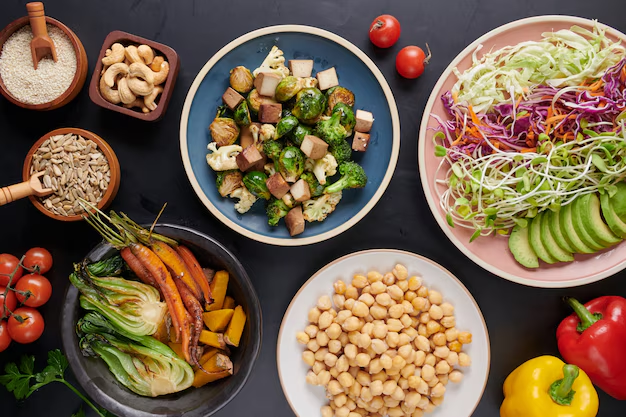
Why Vegan Diets Benefit the Skin ?
Nutrient-Dense Foods: Fruits, vegetables, legumes, nuts, and seeds are packed with vitamins, antioxidants, and minerals that promote collagen production, reduce oxidative stress, and improve skin elasticity.
Anti-Inflammatory Effects: Vegan diets typically contain fewer inflammatory foods (like dairy and processed meats), which means reduced breakouts, puffiness, and redness in the skin.
Hormonal Balance: Many plant-based foods help balance hormones, which can be key in preventing acne and other skin conditions.
Hydration: High-water content foods like fruits and vegetables can help hydrate the skin, giving it a plump and healthy appearance.
Top Tips for Vegan Diet for Glowing Skin
Load Up on Antioxidant-Rich Foods
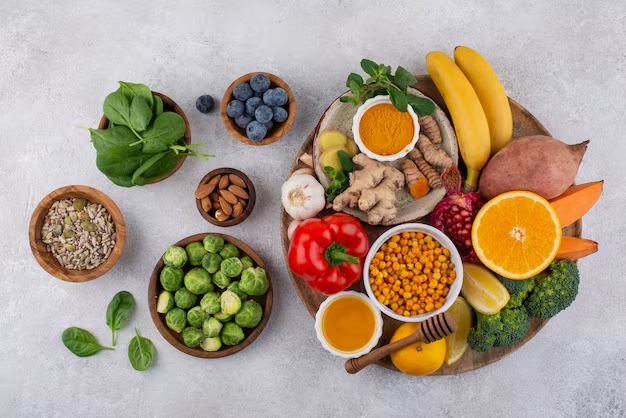
Vegan diet for skin health greatly benefits from antioxidant-rich foods that help combat oxidative stress and free radical damage. Antioxidants protect skin cells, reduce signs of aging, and support a clear, radiant complexion by neutralizing harmful molecules caused by pollution, sun exposure, and poor diet.
Fruits and vegetables like berries, spinach, kale, carrots, and sweet potatoes are loaded with powerful antioxidants such as vitamins A, C, and E. These nutrients help repair skin damage, boost collagen production, and maintain skin elasticity. Including a colorful variety of produce in your daily meals ensures you’re getting a wide range of skin-protective compounds.
When following a vegan diet for skin, it’s essential to make antioxidant-rich foods a cornerstone of your routine. Their protective properties work from the inside out, giving your skin the resilience it needs to stay smooth, vibrant, and healthy. Nourish your skin naturally through smart, plant-based choices.
What to Eat: Berries (blueberries, raspberries, strawberries), pomegranates, kale, spinach, artichokes, and dark chocolate.
Why It Works: Antioxidants help protect your skin from oxidative stress and environmental damage. They neutralize free radicals, which can accelerate aging and contribute to skin problems. Berries, in particular, are rich in vitamin C, which helps promote collagen production for youthful skin.
Benefits:
Fights free radicals
Helps produce collagen
Reduces signs of aging
Include Omega-3 Fatty Acids for Hydrated Skin
Vegan diet for skin health isn’t complete without omega-3 fatty acids, which play a key role in maintaining skin hydration and elasticity. These healthy fats help strengthen the skin barrier, reducing water loss and protecting against dryness, irritation, and inflammation.
Although omega-3s are often associated with fish, there are plenty of plant-based options suitable for a vegan lifestyle. Flaxseeds, chia seeds, walnuts, and hemp seeds are all rich in ALA (alpha-linolenic acid), a type of omega-3 that supports skin health. Including these in your meals or smoothies can help your skin retain moisture and look naturally dewy.
A well-balanced vegan diet for skin should consistently include these sources of omega-3s to support the skin from within. When your body has the essential fats it needs, your skin reflects that nourishment with a healthy glow and fewer signs of dryness or premature aging. Prioritize these foods for naturally radiant, hydrated skin.
What to Eat: Chia seeds, flaxseeds, walnuts, and algae-based supplements.
Why It Works: Omega-3 fatty acids are essential fats that help reduce inflammation in the body. They are critical for maintaining the skin’s barrier function, preventing moisture loss, and keeping your skin hydrated. This can result in plump, smooth skin and reduce the appearance of fine lines and dryness.
Benefits:
Increases skin hydration
Reduces skin redness and inflammation
Improves elasticity
Go for Zinc-Rich Foods for Acne-Free Skin
Vegan diet for skin improvement often includes a focus on essential minerals, and zinc is one of the most important for clear, acne-free skin. Zinc helps regulate oil production, supports wound healing, and reduces inflammation—making it a powerful nutrient in the fight against breakouts.
While animal products are common sources of zinc, there are plenty of plant-based alternatives. Foods like pumpkin seeds, lentils, chickpeas, quinoa, oats, and tofu are excellent vegan sources of zinc. Incorporating these regularly into your meals ensures your skin gets the nourishment it needs to stay balanced and healthy.
In a vegan diet for skin, maintaining adequate zinc levels can make a noticeable difference in reducing acne and promoting a smoother complexion. Be mindful of your intake, especially if you’re prone to blemishes, and consider pairing zinc-rich foods with vitamin C to enhance absorption. Clear skin starts from within—and the right vegan choices can make all the difference.
What to Eat: Pumpkin seeds, lentils, chickpeas, quinoa, and tofu.
Why It Works: Zinc is an essential mineral for skin health. It has anti-inflammatory properties that can help reduce acne breakouts. Zinc also aids in the production of collagen and promotes the healing of skin tissue.
Benefits:
Reduces acne and breakouts
Promotes wound healing
Boosts collagen production
Drink Plenty of Water & Hydrating Foods
Vegan diet for skin health goes hand in hand with proper hydration. Drinking plenty of water throughout the day helps flush out toxins, supports digestion, and maintains skin elasticity. Hydration is one of the most underrated yet essential components for a glowing, healthy complexion.
In addition to water, include hydrating plant-based foods in your meals. Fruits like watermelon, cucumber, oranges, and strawberries, and vegetables such as celery and lettuce, are naturally high in water content. These foods provide essential vitamins and minerals while keeping your body and skin moisturized from within.
Following a vegan diet for skin means prioritizing hydration as much as nutrition. When your body is well-hydrated, your skin appears plumper, smoother, and more radiant. Combine plenty of fluids with moisture-rich foods to boost your skin’s natural glow and improve its texture—naturally and effectively, the vegan way.
What to Eat: Cucumbers, watermelon, celery, and oranges.
Why It Works: Hydration is key to maintaining healthy, glowing skin. Water and hydrating fruits and vegetables replenish skin cells, making your complexion look radiant and fresh. Well-hydrated skin is less prone to developing fine lines and wrinkles.
Benefits:
Maintains skin hydration
Promotes a fresh, glowing complexion
Reduces puffiness and dryness
Embrace Vitamin C for Bright, Clear Skin
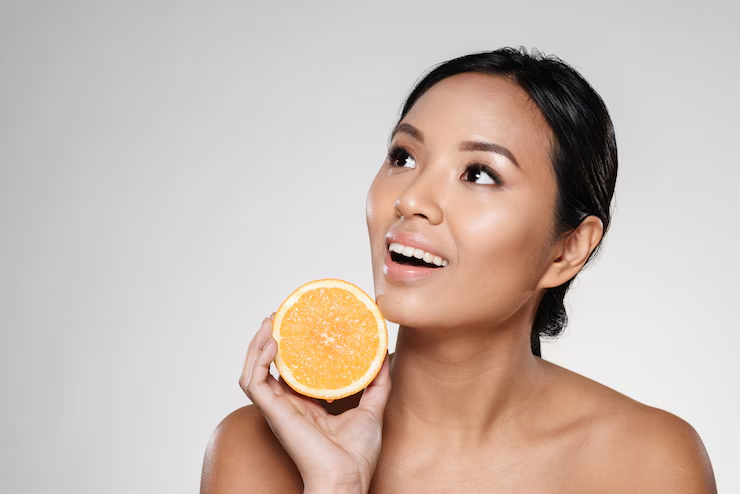
Vegan diet for skin health thrives on vitamin-rich, plant-based foods—especially those high in vitamin C. This essential nutrient plays a crucial role in collagen production, which helps maintain skin firmness and elasticity. A consistent intake of vitamin C can reduce the appearance of fine lines, brighten the complexion, and protect the skin from damage caused by environmental stressors.
Fruits like oranges, kiwi, strawberries, papaya, and guava, along with vegetables such as bell peppers, broccoli, and kale, are all excellent sources of vitamin C on a vegan diet. These foods not only support immune health but also nourish your skin from within, helping you achieve a healthy, radiant glow naturally.
Incorporating vitamin C-rich foods into your vegan diet for skin is a simple yet effective way to enhance your skincare routine. When consumed regularly, these nutrients contribute to a brighter, clearer complexion, showing that beauty truly starts from the inside out.
What to Eat: Oranges, kiwi, bell peppers, strawberries, and broccoli.
Why It Works: Vitamin C is a powerful antioxidant that helps brighten the skin and reduce hyperpigmentation. It also supports collagen synthesis, which helps with skin elasticity and firmness.
Benefits:
Brightens the skin and evens out skin tone
Reduces dark spots and pigmentation
Supports collagen production
Incorporate Probiotics for a Healthy Gut and Skin
Vegan diet for skin health goes beyond just fruits and vegetables—it also includes taking care of your gut. A healthy gut microbiome is closely linked to clearer, healthier skin. Incorporating plant-based probiotics into your diet helps maintain a balanced digestive system, which in turn reduces inflammation and skin issues like acne, dryness, and dullness.
Fermented foods like kimchi, sauerkraut, miso, tempeh, and plant-based yogurt are excellent sources of probiotics on a vegan diet. These foods introduce beneficial bacteria into your digestive system, helping it function efficiently and improving nutrient absorption—both of which support vibrant skin from the inside out.
Making probiotics a regular part of your vegan diet for skin can lead to noticeable improvements in your complexion. When your gut is happy and balanced, toxins are less likely to build up and show through your skin. This simple dietary addition is a powerful step toward clearer, glowing skin.
What to Eat: Sauerkraut, kimchi, kombucha, miso, and plant-based yogurt.
Why It Works: Gut health and skin health are closely linked. A diet rich in probiotics supports a healthy gut microbiome, which can reduce the likelihood of inflammatory skin conditions like acne and eczema. A balanced gut can also help regulate hormones, contributing to clearer skin.
Benefits:
Supports gut health
Reduces inflammation and acne
Balances skin’s microbiome
Avoid Processed Foods and Sugar
Vegan diet for skin health isn’t just about what you include—it’s also about what you avoid. Processed foods and refined sugars can wreak havoc on your skin by triggering inflammation, increasing oil production, and accelerating aging. Even on a vegan diet, it’s important to stay mindful of plant-based junk foods like sugary snacks, fried items, and refined carbs.
When you reduce your intake of processed foods and sugar, your body experiences fewer insulin spikes, which helps maintain balanced hormones and healthier skin. Skin conditions like acne, dullness, and redness often improve when artificial additives and high-glycemic foods are eliminated from the diet.
To get the most out of your vegan diet for skin, focus on whole foods like fruits, vegetables, legumes, whole grains, nuts, and seeds. These natural options provide antioxidants and nutrients that promote a clear, glowing complexion while supporting overall health from the inside out.
What to Avoid: Processed snacks, sugary drinks, refined carbohydrates, and fried foods.
Why It Works: High-sugar and processed foods can cause spikes in insulin, which may lead to increased oil production and clogged pores. Sugar also accelerates the formation of advanced glycation end-products (AGEs), which break down collagen and elastin, speeding up the aging process.
Benefits:
Reduces acne and inflammation
Prevents premature aging
Promotes clear, smooth skin
Include Vitamin E-Rich Foods for Skin Protection
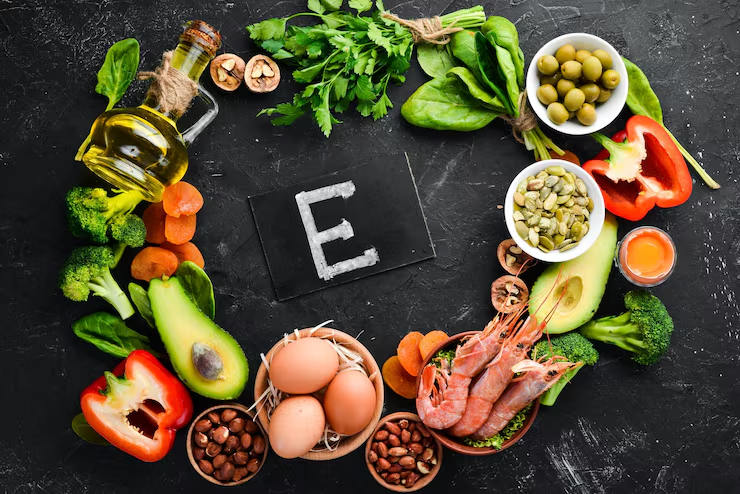
Vegan diet for skin health thrives on including powerful nutrients like vitamin E, which plays a crucial role in protecting and rejuvenating the skin. Vitamin E is a potent antioxidant that helps neutralize free radicals, reduce oxidative stress, and prevent premature aging. For those following a plant-based lifestyle, getting enough of this vitamin is essential for maintaining healthy, radiant skin.
Foods rich in vitamin E include sunflower seeds, almonds, hazelnuts, spinach, and avocados—all staples of a well-balanced vegan diet for skin. These foods not only nourish the skin but also help lock in moisture, support cell regeneration, and improve elasticity, making them perfect additions to your daily meals.
Incorporating vitamin E-rich foods consistently into your diet can result in visible improvements in skin tone, texture, and overall glow. A vegan diet for skin that includes these nutrient-packed choices supports a youthful appearance naturally, without the need for synthetic supplements or harsh treatments.
What to Eat: Almonds, sunflower seeds, avocados, and spinach.
Why It Works: Vitamin E is a potent antioxidant that protects your skin from UV damage and helps repair damaged skin cells. It also plays a role in maintaining the skin’s moisture balance.
Benefits:
Protects against sun damage
Enhances skin healing
Maintains skin elasticity
Additional Tips for Glowing Skin
Exfoliate Gently: Use gentle exfoliating methods, like a scrub made from oats or sugar, to remove dead skin cells without stripping your skin’s natural oils.
Exercise Regularly: Exercise boosts blood circulation, which delivers oxygen and nutrients to your skin, improving its health and radiance.
Sleep Well: A proper sleep routine is essential for cell regeneration. Aim for 7-9 hours of sleep to allow your skin to repair and rejuvenate.
How Vegan Diet Helps Specific Skin Conditions
Acne: Acne is often linked to inflammation, hormonal imbalances, and excess oil production. A vegan diet can significantly reduce acne flare-ups by cutting out dairy, which is a common trigger for acne. Plant-based foods that are high in zinc, antioxidants, and healthy fats can help regulate hormone levels, reduce inflammation, and keep the skin hydrated, all of which contribute to fewer breakouts.
For example, a diet rich in omega-3 fatty acids from flaxseeds or chia seeds helps reduce the production of inflammatory molecules in the skin, preventing clogged pores and acne. Zinc-rich foods like pumpkin seeds and lentils can regulate oil production, preventing the formation of acne.
Eczema and Psoriasis: Eczema and psoriasis are autoimmune conditions that cause red, inflamed skin patches. Both conditions are worsened by inflammation, and a vegan diet can help reduce this inflammation by providing a wealth of antioxidants, such as Vitamin C and Vitamin E. Vegan foods like green leafy vegetables, berries, and almonds can play a critical role in managing these conditions by reducing flare-ups and soothing irritated skin.
Additionally, omega-3 fatty acids in flaxseeds and walnuts are known to reduce inflammation and support the skin’s moisture barrier, which is especially beneficial for those with eczema and psoriasis.
Hyperpigmentation: Hyperpigmentation, or dark spots, can result from acne scars, sun exposure, or aging. A vegan diet rich in Vitamin C, found in citrus fruits, strawberries, and bell peppers, can help brighten the skin and fade dark spots over time. Vitamin C not only reduces melanin production but also stimulates collagen synthesis, helping the skin heal faster.
The Vegan Diet and Aging Skin
As we age, our skin naturally loses elasticity and the ability to retain moisture. However, certain plant-based foods can help slow this process and even reverse some of the damage. Foods rich in antioxidants and healthy fats can help protect the skin from environmental stressors, such as UV rays and pollution, that accelerate aging.
Avocados, rich in healthy monounsaturated fats, are particularly beneficial for maintaining skin moisture and elasticity. Berries, loaded with antioxidants, help to fight free radicals, while leafy greens provide vital nutrients that promote collagen synthesis.
Regular consumption of these skin-boosting foods can help preserve youthful skin, reduce wrinkles, and maintain a healthy glow well into your later years.
Lifestyle Habits to Complement Your Vegan Diet for Skin
While diet plays a significant role in skin health, other lifestyle habits are equally important for achieving and maintaining clear, glowing skin.
Proper Skincare Routine: No matter how nutritious your diet is, a proper skincare routine is essential for keeping your skin clean, hydrated, and protected. Regularly cleanse your face with a gentle, plant-based cleanser, exfoliate once a week to remove dead skin cells, and always apply sunscreen during the day.
Stress Management: Stress is a major trigger for skin conditions such as acne, eczema, and psoriasis. Finding ways to manage stress, whether through meditation, yoga, or deep breathing, can help maintain a calm and clear complexion.
Sleep: During sleep, the body repairs and regenerates skin cells. Aim for 7-9 hours of quality sleep each night to give your skin the rest it needs to repair and regenerate. Incorporate a relaxing nighttime routine to ensure you get restful sleep.
Exercise Regularly: Exercise boosts circulation, ensuring that oxygen and nutrients reach the skin more efficiently. Sweating also helps to expel toxins from the body, which can benefit the skin’s overall appearance.
Conclusion
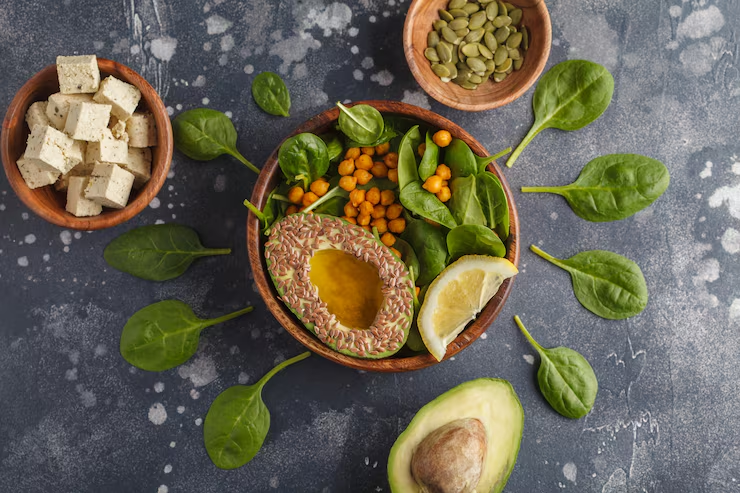
Vegan diet for skin health is more than just excluding animal products—it’s about embracing whole, nutrient-rich plant foods that fuel your body from the inside out. Leafy greens, colorful fruits, seeds, nuts, and legumes provide essential vitamins and antioxidants that directly support skin health.
By following the eight simple tips above, you can enhance your skin’s hydration, improve elasticity, and restore a natural glow. A vegan diet for skin works by reducing inflammation, combating oxidative stress, and supporting collagen synthesis—all of which contribute to firmer, more youthful-looking skin.
Making the shift to a plant-based lifestyle doesn’t just benefit your skin—it boosts your overall well-being. With consistency and the right food choices, the changes will reflect on your face. So, whether you’re looking to clear up blemishes or maintain a healthy glow, the vegan diet for skin offers a sustainable, effective path to beauty from within. Start today, and let your skin thrive.
FAQs
Q1: Can a vegan diet help clear up acne ?
Yes, a vegan diet can help clear acne. By eliminating dairy and processed foods, which can contribute to inflammation and hormonal imbalance, and replacing them with antioxidant-rich fruits and vegetables, you can significantly reduce acne flare-ups.
Q2: What are the best vegan foods for healthy skin ?
The best vegan foods for skin health include antioxidant-rich berries, omega-3-rich flaxseeds, zinc-rich pumpkin seeds, and vitamin C-packed citrus fruits. These foods support collagen production, reduce inflammation, and enhance hydration.
Q3: Is a vegan diet effective for anti-aging ?
Yes, a vegan diet can be effective for anti-aging. By consuming plenty of fruits and vegetables that are rich in antioxidants and essential vitamins like Vitamin C and E, you can reduce free radical damage, protect the skin from UV rays, and promote youthful skin.
Q4: Can I get enough protein on a vegan diet for skin health ?
Absolutely! Many plant-based sources like lentils, chickpeas, quinoa, tofu, and hemp seeds provide plenty of protein. Protein is essential for repairing damaged skin cells and boosting collagen production.
Q5: How long does it take for a vegan diet to show skin improvements ?
Skin improvements from a vegan diet can vary depending on individual factors like skin type and existing conditions. However, most people start seeing noticeable changes in skin texture and appearance within 4 to 6 weeks of consistently following a plant-based diet.


